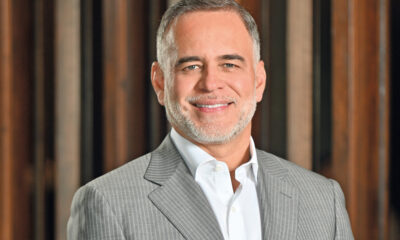Finanzas
Cuándo acudir con un contador
Publicado
3 años antesel
Por
Staff
Dependiendo del tamaño de tu empresa y las necesidades de esta, es que deberás tomar la decisión que más te convenga Por: Cambio de Cultura
Cuando una persona quiere emprender o ya está en un emprendimiento, una de las preguntas recurrentes es: “¿en qué momento debería acudir a un contador?”, o “¿cuándo debería contratar uno?”.
Lo primero que debemos apuntar es lo que nos recomienda la palabra de Dios en el pasaje inicial, “En la multitud de consejeros los pensamientos se afirman”. Con esto en mente, si ya estás emprendiendo o estás apunto de hacerlo, deberías considerar acercarte a un contador.
¡Ojo! no estamos diciendo que tienes necesariamente que contratar un contador, sino que requieres al menos, el consejo de un contador para que te pueda indicar cuáles son algunas cosas que debes considerar en cuanto a pagos de impuesto o estrategias financieras que te ayuden a manejar de mejor forma las finanzas de tu negocio.
Entonces, quizá la pregunta más adecuada es “¿qué tanto necesitamos que se involucre un contador en nuestro emprendimiento?”.
Cada empresa se encuentra en diferente etapa de su ciclo de vida y desarrollo. Algunas con asuntos financieros muy sencillos y contratar a un contador puede ser un gasto innecesario, pero conforme un negocio comienza a crecer, los compromisos financieros y el número de requerimientos fiscales que se tienen que cumplir pueden llegar a ser agobiantes.
En ésta situación, contratar a un contador se puede considerar más como una inversión que un gasto y a la larga, te pagará dividendos.
Pautas para acudir a un contador
• En qué me puede ayudar un contador:Un contador al menos te puede ayudar en cuatro cosas que están relacionados a las finanzas de tu negocio: declaración de impuestos, hacer un presupuesto para tu empresa, preparar estados financieros y dar consejo fiscal (qué régimen fiscal te conviene más).
Lo primero que necesitamos entender es, ¿en qué áreas necesitas ayuda? ¿En cuál de estas tareas necesitas habilidades y apoyo? y en base a tu respuesta es el tipo de involucramiento que requerirás del contador.
• Cuánto tiempo se requiere para hacer estas tareas: Dependiendo del tamaño que sea tu emprendimiento o negocio, será la necesidad de tiempo que se requerirá para hacer estas actividades. Entender cuánto tiempo toma llevar a cabo estas tareas cada mes, es lo que determinará al final si requiero contratar a un contador de tiempo completo, a tiempo parcial o simplemente acudir a uno para recibir asesoría y consejo.
• Cuánto te va a costar: El costo de un contador es algo que muchas veces no se considera cuando calculamos costos en un negocio, pero es algo que no podremos evitar. Cuando somos pequeños hay muchas cosas que podemos hacer nosotros mismos, pero en la media que crecemos necesitaremos concentrarnos en otras cosas del negocio y necesitaremos delegar las tareas contables. Trata de visualizar los beneficios que te puede traer un buen contador, por ejemplo, ahorros fiscales, evitar penalizaciones o multas, optimizar tu tiempo, ayudarte en la toma de decisiones con buena información.
Si eliges bien, a la larga puede pagarse sólo.
• Honestidad y Confianza: Este punto no es asunto menor, debes poder confiar en tu contador. Hay dos elementos que construyen la confianza: La honestidad y la experiencia. Antes de decidir a qué contador le abrirás los números de tu negocio, deberás evaluar que tan honesto es y si tiene experiencia en las actividades que quieres que te ayude.
La parte de la honestidad tiene que ver con su carácter, el indicador más confiable del carácter de una persona son sus acciones pasadas. Es decir, necesitas investigar un poco acerca de sus experiencias y pedir referencias a las que les puedas preguntar acerca de su honestidad y conocimiento. Te evitarás muchas sorpresas.
Los contadores pueden ayudarte con muchas otras tareas importantes en tu negocio, pero la mayor de ellas es proporcionarte información. La información es necesaria porque nos ayuda a tomar decisiones. Entre más información tengas y de mejor calidad, mejores decisiones tomarás, lo que te hará una mejor administradora de tu negocio o emprendimiento. Dios honrará tu diligencia.
“Los pensamientos son frustrados donde no hay consejo; Mas en la multitud de consejeros se afirman”
Proverbios 15:22
“Donde no hay dirección sabia, caerá el pueblo; Mas en la multitud de consejeros hay seguridad”
Proverbios 11:14
When to go to an accountant
Depending on the size of your company and your company's needs, you should make the decision that best suits you By: Cambio de Cultura
When a person wants to undertake or is already in a venture, one of the recurring questions is: “when should I go to an accountant?” or “when should I hire one?”.
The first thing we should note is what the word of God recommends to us in the opening passage, “In the multitude of counselors the thoughts of affirm.” With this in mind, if you are undertaking or about to do so, you should consider approaching an accountant.
We are not saying that you necessarily have to hire an accountant, but that you require at least the advice of an accountant so that they can tell you what are some things you should consider about tax payments or financial strategies that will help manage your business.
So, perhaps the more appropriate question to ask is, “how much do we need an accountant involved in our business?
Every business is at a different stage in its life cycle and development. Some have elementary financial matters, and hiring an accountant may be an unnecessary expense. Still, as a business grows, the financial commitments and the number of tax requirements that must be met can become overwhelming.
In this situation, hiring an accountant can be considered more of an investment than an expense and will pay dividends in the long run.
Guidelines for using an accountant
• What an accountant can help me with: An accountant can help you with at least four things related to your business finances: filing taxes, budgeting for your business, preparing financial statements, and giving tax advice (which tax regime is best for you).
The first thing we need to understand is in which areas you need help, in which of these tasks do you need skills and support and, based on your answer, the type of involvement you will require from the accountant.
How much time will be needed to do these activities depends on the size of your business. Understanding how much time it takes to perform these tasks each month will ultimately determine whether I need to hire a full-time accountant, a part-time accountant or just go to one for advice and counsel.
• How much it will cost you: The cost of an accountant is often not considered when we calculate costs in a business, but it is something that we will not be able to avoid. When we are small, there are many things we can do ourselves, but as we get older, we will need to concentrate on other items in the business and will need to delegate accounting tasks. Try to visualize the benefits of a good accountant, such as tax savings, avoiding penalties or fines, optimizing your time, and help you make decisions with good information.
If you choose well, it can pay for itself in the long run.
• Honesty and Trust: This point is no small matter, you must be able to trust your accountant. Two elements build trust: honesty and experience. Before deciding which accountant you will open your business numbers to, you should evaluate how honest they are and if they have experience in the activities you want them to help you with.
The honesty part has to do with their character; the most reliable indicator of a person’s character is their past actions. You need to do some research about their experiences and ask for references that you can ask about their honesty and knowledge. You will avoid any surprises.
Accountants can help you with many other essential tasks in your business, but the biggest one is to provide you with information. Information is necessary because it helps us make decisions. The more and better quality information you have, the better decisions you will make, which will make you a better manager of your business or venture. God will honor your diligence.
“Thoughts are frustrated where there is no counsel, but they are established in the multitude of counselors.”
Proverbs 15:22
“Where there is no wise guidance, the people fall, but there is safety in the multitude of counselors.”
Proverbs 11:14

¿Alguna vez has sentido que el dinero se te escurre de las manos como arena? En esta vida, entre los deseos y las tentaciones del consumo, a veces parece imposible mantener nuestras finanzas en orden. Pero queremos compartirte una verdad poderosa que nos puede liberar y bendecir: el arte de ahorrar.
La palabra “ahorro” tiene una historia muy interesante. Viene del árabe “hurr”, que significa “libre”. Originalmente, “ahorrar” significaba liberar a un esclavo o a alguien de una carga. ¡Qué revelador! Cuando ahorramos hoy, no solo estamos guardando dinero, sino que nos estamos liberando de las ataduras financieras que nos impiden alcanzar nuestras metas personales.
Ahorrar no es ser tacaño, ¡para nada! Es desarrollar una actitud sabia y de buena administración. La Biblia nos lo enseña claramente: “El sabio ahorra para el futuro, pero el necio derrocha cuanto obtiene” (Proverbios 21:20)7. ¡Salomón sabía de lo que hablaba!
5 errores comunes que nos impiden ahorrar:
A menudo, sin darnos cuenta, cometemos ciertos errores que sabotean nuestros esfuerzos por ahorrar. ¡Identifiquémoslos para poder superarlos!
- No distinguir entre necesidades y deseos: Tendemos a gastar por impulso en lo que queremos, sin preguntarnos si realmente lo necesitamos. Una necesidad es un requisito legítimo para nuestro bienestar o el de nuestra familia, mientras que un deseo es algo que queremos sin respetar las consecuencias. Enfocarse en las necesidades básicas primero es fundamental.
- No tener un plan de gastos: Muchas veces, el dinero simplemente “desaparece” porque no sabemos en qué lo gastamos. No crear un presupuesto familiar y evaluar cada gasto es un error que nos impide ver dónde se va el dinero y dónde podemos ajustarnos.
- Comprar impulsivamente sin preguntar: ¿Cuántas veces hemos comprado algo porque nos gustó en el momento, sin considerar si lo necesitamos, si podemos pagarlo de contado, por qué lo queremos o cuándo podemos comprarlo? Esta falta de reflexión antes de gastar nos lleva a mucha frustración.
- No llevar registros confiables: Si no guardamos las notas de compra del mes o no registramos cada transacción, es imposible saber adónde se va nuestro dinero. Sin estos registros, no podemos identificar gastos innecesarios ni hacer los recortes necesarios.
- Vivir al día y no planificar para el futuro: Este es un error grave. Si no tenemos una reserva de dinero para gastos no planeados o no ahorramos para el mañana, nos volvemos vulnerables a las dificultades financieras. El sabio ahorra y construye para el futuro, mientras que el necio derrocha cuanto obtiene.
En un mundo donde la publicidad nos grita “¡quiero, quiero, quiero!” y el crédito fácil nos envuelve en planes de pago casi imposibles, el ahorro es un acto de rebeldía y sabiduría. Nos ayuda a evitar ser despilfarradores y a vivir dentro de nuestras posibilidades. Nuestros hijos y nietos nos lo agradecerán por ser un ejemplo de vida.
Recordemos el sabio consejo de M.F. Tupper: “Economía, la fábrica del pobre; el derroche, la trampa del rico”. Ya sea que tengamos mucho o poco, la sabiduría financiera es un principio que nos acerca a la libertad y a una vida más plena.
Saving to Flourish: 5 Common Mistakes
Do you feel like money is slipping away without you even realizing it? In a world filled with desires and consumer impulses, learning to save is not only necessary, but liberating.
Have you ever felt like money is slipping through your fingers like sand? In this life, between the desires and temptations of spending, it sometimes seems impossible to keep our finances in order. But we want to share with you a powerful truth that can free and bless us: the art of saving .
The word “thrift” has a very interesting history. It comes from the Arabic ” hurr, ” meaning “free“. Originally, “to save” meant to free a slave or someone from a burden. How revealing! When we save today, we’re not just putting money aside, we’re freeing ourselves from the financial shackles that prevent us from achieving our personal goals.
Saving isn’t about being stingy—not at all! It’s about developing a wise and good stewardship attitude. The Bible teaches us this clearly: “A wise man lays up money for the future, but a fool squanders everything he gets” (Proverbs 21:20). Solomon knew what he was talking about!
5 common mistakes that prevent us from saving:
We often make certain mistakes without realizing it that sabotage our savings efforts. Let’s identify them so we can overcome them!
- Failing to distinguish between needs and wants: We tend to spend impulsively on what we want, without asking ourselves if we really need it. A need is a legitimate requirement for our well-being or that of our family, while a want is something we want without regard for the consequences. Focusing on basic needs first is critical.
- Not having a spending plan: Often, money simply “disappears” because we don’t know how we spend it. Not creating a family budget and evaluating each expense is a mistake that prevents us from seeing where the money is going and where we can make adjustments.
- Impulse buying without question: How many times have we bought something because we liked it at the time, without considering whether we need it, whether we can pay for it in cash, why we want it, or when we can buy it? This lack of reflection before spending leads to a lot of frustration.
- Not keeping reliable records: If we don’t keep monthly purchase notes or record every transaction, it’s impossible to know where our money is going. Without these records, we can’t identify unnecessary expenses or make the necessary cuts.
- Living for the day and not planning for the future: This is a serious mistake. If we don’t have a reserve of money for unplanned expenses or don’t save for tomorrow, we become vulnerable to financial hardship. The wise save and build for the future, while the foolish squander everything they get.
In a world where advertising screams “I want, I want, I want!” and easy credit lulls us into almost impossible payment plans, saving is an act of rebellion and wisdom. It helps us avoid being wasteful and live within our means. Our children and grandchildren will thank us for being an example of life.
Tupper ‘s wise advice : “Economy is the poor man’s factory; waste is the rich man’s trap.” Whether we have much or little, financial wisdom is a principle that brings us closer to freedom and a more fulfilling life.
Finanzas
Vacaciones a la medida de tu cartera
Publicado
4 meses antesel
01/07/2025Por
Adriana Camino
Una buena planificación te permite disfrutar del presente y evitar preocupaciones futuras
Llegaron las vacaciones y con ellas la oportunidad de disfrutar, ya sea viajando o quedándote en casa, y para que este período no se convierta en una fuente de estrés financiero, te compartimos algunos consejos que te permitirán relajarte sin gastar de más.
1. Planea con anticipación
Si vas a salir de la ciudad, aprovecha las ofertas de temporada y adquiere con tiempo vuelos o paquetes turísticos. Investiga actividades gratuitas o de bajo costo en tu destino; muchas veces son igual de divertidas y enriquecedoras. Incluso si te quedas en casa, buscar opciones accesibles para pasear dentro de tu ciudad también puede ser una gran alternativa.
2. Cuida los pequeños gastos, pero sé flexible
Durante los paseos, especialmente en épocas de calor, es común que se nos antoje algo refrescante, sin embargo, estos pequeños gastos, que en apariencia son insignificantes, pueden acumularse rápidamente y convertirse en grandes cantidades.
Tener claro cuál es tu presupuesto para estos gastos es ideal, a la par que puedes implementar estrategias como llevar en algunas ocasiones tus propios snacks y bebidas, aunque puedes tener cierta flexibilidad según lo amerite la situación, así podrás evitar decisiones impulsivas y disfrutarás en el momento adecuado, sin sentirte limitado.
3. Prioriza experiencias sobre objetos
Si decides comprar algún suvenir, trata de no hacerlo en las zonas más turísticas, donde los precios suelen ser más elevados, evita comprar de más, no necesitas llevarle algo a todos tus conocidos. Invierte mejor en experiencias que realmente disfrutarás y recordarás, en lugar de en objetos que luego terminarán arrumbados en algún rincón.
4. Disfruta también en casa
Quedarte en casa puede ser igual de gratificante. Aprovecha para reconectar contigo y con tu familia: organiza una tarde de juegos, maratón de películas, tiempos de lectura, platicar mientras comparten una taza de té o café, etcétera. Estar en casa relajados y disfrutar de todo aquello que a veces la rutina acelerada no nos permite también es una bendición y estos momentos pueden convertirse en recuerdos inolvidables.
5. Piensa a futuro
No olvides que después de las vacaciones volveremos a la rutina y los gastos normales siguen necesitando ser cubiertos; todos aquellos gastos hechos con las tarjetas de crédito deberán de ser pagados o terminarás pagando mucho más en intereses, además, terminando las vacaciones, llegan los gastos del regreso a clases.
Por eso, una buena planificación no sólo te permite disfrutar del presente, sino también evitar preocupaciones futuras.
La clave está en organizarte y tomar decisiones conscientes para que el descanso no se traduzca en deudas innecesarias. ¡Felices vacaciones!
Vacations Tailored to Your Budget
Good planning allows you to enjoy the present and avoid future worries.
Vacation time is here bringing with it the opportunity to enjoy yourself, whether you’re traveling or staying at home. To make sure this period doesn’t become a source of financial stress, here are some tips to help you relax without overspending:
1. Plan Ahead
If you’re planning to leave town, take advantage of seasonal deals and book your flights or travel packages early. Look into free or low-cost activities at your destination—these can often be just as fun and enriching. Even if you’re staying home, exploring affordable options in your own city can be a great alternative.
2. Watch the Small Expenses—but Stay Flexible
While out and about—especially in hot weather—it’s common to crave something refreshing. But these small, seemingly harmless purchases can add up quickly.
Having a clear budget for these expenses is ideal. You can also bring your own snacks and drinks at times, while still allowing for some flexibility depending on the situation. This way, you’ll avoid impulse decisions and enjoy treats when the time is right—without feeling restricted.
3. Prioritize Experiences Over Objects
If you decide to buy a souvenir, try not to do so in tourist-heavy areas where prices are inflated. Avoid overbuying—there’s no need to get something for everyone you know. Invest in experiences you’ll truly enjoy and remember, rather than in items that might end up forgotten in a drawer.
4. Enjoy Time at Home Too
Staying home can be just as rewarding. Take the opportunity to reconnect with yourself and your family—organize a game night, a movie marathon, reading time, or simple conversations over tea or coffee.
Relaxing at home and enjoying the little things we often miss in our busy routines is a gift—and these moments can become unforgettable memories.
5. Think Ahead
Don’t forget that after the holidays, normal life—and expenses—resume. Credit card charges will need to be paid, and back-to-school costs are just around the corner.
That’s why good planning doesn’t just help you enjoy the moment—it also helps you avoid future stress.
The key is to stay organized and make conscious decisions, so your time off doesn’t turn into unnecessary debt.
Happy holidays!

Cuando descubrí que podía hacer muchas cosas al mismo tiempo y ser exitosa en todas, ya nada me detuvo. Siendo hija de Dios, y con habilidades para vender descubrí que ser Emprendedora era una de las grandes bendiciones que se me habían dado a manos llenas.
Como a toda mujer le gusta gastar, un día me frustré tanto por la mala economía de mi cartera, que le pedí al Espíritu Santo un negocio. Y saben que paso me lo dio… al estudiar las escrituras, sobre todo proverbios 31 me di cuenta que puedo servir a Dios, a mi familia, comunidad y al mismo tiempo tener mi propio negocio.
He tenido que aprender muchas cosas en cuanto a vender, especializarme en productos, trabajar en redes, etc… pero ha sido para ganar, avanzar e inspirar. Desde el 2016 empecé a vender productos naturales alcanzando los primeros lugares de ventas en los Estados Unidos. En el 2020 ingrese a un negocio multinivel que me ha dado grandes satisfacciones como conocer Turquía.
Hoy puedo decir con seguridad que dentro de todo lo que Dios nos dio a las mujeres, una cualidad importante es la gran habilidad de hacer negocios.
Hoy te lo digo a ti hermosa visionaria, no te detengas. Atrévete a desarrollar esa idea que tanto ronda por tu cabeza, puedes alcanzar tus sueños si te lo propones.
Puede ser de gran bendición para el hogar y una ayuda idónea para tu esposo.
En este punto he emprendido ya muchos negocios, algunos han funcionado, otros realmente no, pero nunca he perdido nada, al contrario he ganado mucha experiencia y aprendizaje. En Cristo lo tenemos todo.
Passionate Entrepreneur
Knowing how to sell and develop a business is one of the great blessings God gives us in abundance.
When I discovered I could do multiple things at once and be successful at all of them, nothing stopped me. As a daughter of God and skilled at selling, I discovered that being an entrepreneur was one of the great blessings I’d been given in abundance.
Like any woman who loves to spend, one day I became so frustrated with my poor wallet that I asked the Holy Spirit for a business, and you know what happened? He gave it to me.
By studying the Scriptures, especially Proverbs 31, I realized I can serve God, my family, and my community while also having my own business. However, I’ve had to learn many things about selling, specializing in products, networking, and so on.
It’s all been about winning, advancing, and inspiring. Since 2016, I began selling natural products, reaching the top of the sales charts in the United States, and in 2020, I entered a multi-level marketing business that has given me great satisfaction, including getting to know Turkey.
Today I can confidently say that among all the things God has given us women, an important quality is great business acumen.
I say this to you, beautiful visionary: don’t hold back, dare to develop that idea that’s been floating around in your head. You can achieve your dreams if you set your mind to it. It’s also a great blessing for your home and a perfect help for your husband.
At this point, I’ve started many businesses; some have worked out, others haven’t, but I’ve never lost anything; on the contrary, I’ve gained a lot of experience and learning. In Christ, we have everything.
















